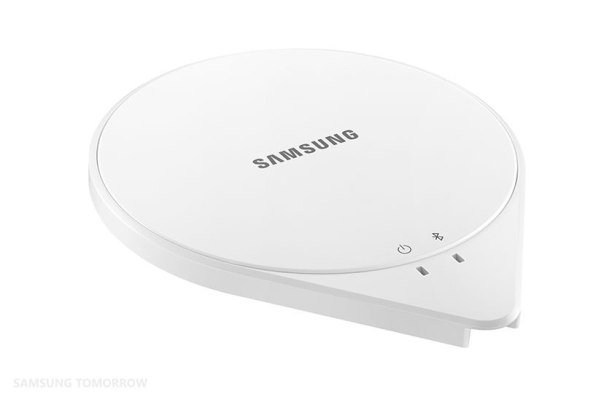In its quest to sell more gizmos in our smartphone-saturated era, Samsung is pushing deep into the so-called ‘smart home.’ Earlier today Samsung-owned SmartThings released a new line-up of in-home sensors for its Internet of Things connector hub. Now the mothership has followed up by outing a sleep tracker, called SleepSense, that can also plug into other connected devices you might have around your home — such as a smart TV or web-enabled air-con.
Why does a sleep sensor need to be able to switch off your TV or tweak your air-con? To help you sleep better, reckons Samsung. The sensor can connect to other Samsung smart appliances (such as its smart TVs), or other non-Samsung connected devices if you have a SmartThings hub to do the bridging — so that it can switch things off or on, or dial things up or down, based on whether you’re falling asleep or about to wake up.
The gizmo will also do what more common or garden sleep trackers do: analyze your “sleep quantity and quality,” dishing up personalised sleep reports and serving up recommendations on how to improve your sleep via the companion mobile app.
Rather than being worn, as with some existing sleep trackers, the contactless SleepSense sensor is placed under your mattress where it can keep tabs on heart and respiratory rates, plus how much the sleeper moves around while they sleep, to power its sleep analytics. It’s unclear if it handles multiple sleepers without mixing up their signals. Update: Samsung has now confirmed that one sensor is needed per sleeper in the bed.
You also get a sleep score so you can compare whether your 40 winks match up to the average for your age. Samsung says its sleep score is based on seven factors: total sleep time, sleep ‘efficiency’, time taken to fall asleep, the number of times you woke up, the number of times you got out of bed, percentage of time in REM (rapid eye movement) sleep, and the percentage of time in deep sleep.
On the tips side, Samsung says it worked with Harvard Medical School Professor Dr Christos Mantzoros to create recommendations for boosting sleep quality — with advice apparently covering areas including lifestyle, nutrition and exercise. (One wonders whether ‘turning off your gadgets several hours before bedtime and reading a (paper) book’ will be among the app’s anti-insomnia advice… )
Another feature of SleepSense touted by Samsung is an alarm that will gradually wake up the user, based on analyzing their sleep cycles to identify the best time to wake them (so avoiding a deep sleep phase). Being late for work because your robot decided to let you sleep in may or may not be an excuse that washes with your boss.
Samsung also suggests the sensor can be used by families to keep tabs on elderly relatives who they might be worried about. The app includes a ‘family care’ option that delivers an analysis of the quality of the user’s sleep to another family member via email.
There’s no word on price or market availability and launch dates for the SleepSense as yet.
